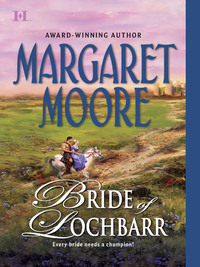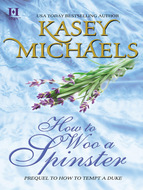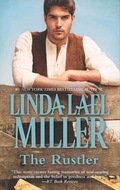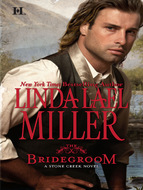Kitap dosya olarak indirilemez ancak uygulamamız üzerinden veya online olarak web sitemizden okunabilir.
Kitabı oku: «Bride of Lochbarr»
PRAISE FOR
MARGARET MOORE
“Margaret Moore’s characters step off the pages into your heart.”
—Romantic Times
“When it comes to excellence in historical romance books, no one provides the audience with more than the award-winning Ms. Moore.”
—Harriet Klausner, Under the Covers
“Ms. Moore…will make your mind dream of knights in shining armor.”
—Rendezvous
“Her writing is full of humor and wit, sass and sexual tension.”
—Heart Rate Reviews
“Margaret Moore has a captivating writing style…that lends itself to pure, fluid prose and vivid characterizations.”
—Heartstrings Reviews
“…an author who consistently knows how to mix just the right amount of passion and pageantry.”
—Old Book Barn Gazette
Dear Reader,
I’m delighted to be part of HQN Books, and thankful for this opportunity to write longer books for Harlequin. I’m especially thrilled that my first HQN novel is set in the medieval time period, my particular favorite.
Why does that time period appeal to me so much? My usual answer to this question is, “There’s just something about a man with a broadsword.” However, what really appeals to me is the emphasis on honor and duty.
If you’re familiar with my Harlequin Historicals books, you know I generally hang my medieval heroes’ helmets in Wales. So why go to Scotland with Bride of Lochbarr? I wanted to venture into what is relatively new territory for me—and I can no longer ignore the allure of men in kilts.
So now you know why that time and place. What about the story? How did I come up with that? I thought, What if a hero comes riding to the rescue and the heroine says “Are you nuts? Go away and leave me alone.” A chivalrous yet flummoxed hero, a defiant woman and a rescue gone awry. I was off and running.
But I don’t write just for myself or my editors. I write for you, the readers. Every time I sit at my computer, my goal is to tell a story that entertains you. As always, I hope I’ve succeeded.

MILLS & BOON
Before you start reading, why not sign up?
Thank you for downloading this Mills & Boon book. If you want to hear about exclusive discounts, special offers and competitions, sign up to our email newsletter today!
Or simply visit
Mills & Boon emails are completely free to receive and you can unsubscribe at any time via the link in any email we send you.
margaret Moore
Brideof Lochbarr

With special thanks to
Amy Wilkins and Melissa Endlich
for their excellent editorial suggestions,
and to Tracy Farrell for another
wonderful opportunity.
CONTENTS
CHAPTER ONE
CHAPTER TWO
CHAPTER THREE
CHAPTER FOUR
CHAPTER FIVE
CHAPTER SIX
CHAPTER SEVEN
CHAPTER EIGHT
CHAPTER NINE
CHAPTER TEN
CHAPTER ELEVEN
CHAPTER TWELVE
CHAPTER THIRTEEN
CHAPTER FOURTEEN
CHAPTER FIFTEEN
CHAPTER SIXTEEN
CHAPTER SEVENTEEN
CHAPTER EIGHTEEN
CHAPTER ONE
Scotland, 1235
MARIANNE WAS in purgatory.
Or so it was easy to believe as she looked out over the sodden landscape from the arched window in her brother’s fortress.
Of course it was raining again, the downpour effectively hiding the jagged hilltops surrounding Beauxville like a veil, making the courtyard a mess of mud and puddles, and soaking the scaffolding erected around the half-completed walls of the castle. It had rained every day since she’d arrived in this wilderness at the edge of the civilized world.
If she were in Normandy now, the sun would be shining and the leaves of the trees would be bright green. She’d be beneath their shading branches, whispering with a gaggle of young women her own age, trying to stifle her laughter as the farm laborers went past the convent walls heading home after a day working in the fields. The young men would be singing their bawdy songs, well aware that behind the white walls of the convent, girls would be listening. The nuns would be scurrying about and twittering like a flock of startled birds, chiding their charges and trying to get them to go inside.
If she were back in Normandy, she would be warm. Here, even wearing a linen shift, a gown of indigo blue wool, a bliaut of light red with gold trim and with a bright green woolen shawl wrapped around her shoulders, she was still cold.
If she were in Normandy, she would be warm and happy, not lonely, cold and utterly, completely miserable.
She should have asked more questions when her brother arrived at the convent and told her he was taking her to his estate. Instead, she’d been too happy to be free of the confines of the religious house and too proud of her noble brother and impressed by his bearing and arms to question him. Even the Reverend Mother had seemed intimidated by Nicholas, and Marianne had believed the pope himself couldn’t intimidate the Reverend Mother.
Yet if the Reverend Mother had known Nicholas was going to bring his sister here, to this mass of unfinished stone and masonry, where she would live among savages with wild hair and bare legs, surely she would have said that Scotland was the last place on earth suitable for a young Norman woman of noble birth and education. She would have suggested to Nicholas that Marianne be allowed to remain in the place that had been her home for the past twelve years until a suitable husband could be found.
The door to her chamber crashed open. Startled, she turned from the window and watched as her brother, new-made lord of Beauxville, strode into the room. As always, Nicholas was plainly attired in black wool without a bit of embroidery at cuff or collar. His only ornamentation was the bronze buckle of his sword belt. His scuffed boots were caked with mud, his hair was damp, and his taciturn expression gave no hint as to why he’d decided to visit her here, where he rarely ventured.
“Ah, here you are, Marianne,” he said, as if he honestly expected her to be somewhere else. He scanned the small room with its simple, crude furnishings and her painted chest, his gaze lingering for a moment on the embroidery frame neglected in the corner. “What are you doing?”
“I was thinking about the convent.”
His response to that was a dismissive sniff, his usual reaction when she mentioned her life there, or spoke of her companions or the sisters. Yet why shouldn’t she think of the past and her life in Normandy? Did he think she could forget it? Did he think she wanted to?
Some of her annoyance seeped out. “Shouldn’t you be supervising the masons at the south wall? Or entertaining that elderly Scot who arrived this morning?”
“The masons are waiting for drier weather, and Hamish Mac Glogan has taken his leave.”
“If the masons need the weather to be dry, they may never finish your castle,” she remarked as she glanced out the window again. To her surprise, it wasn’t actually raining at the moment, although heavy gray clouds still lingered, like a bad smell. “The delays must be costing you a pretty penny.”
“I didn’t realize you knew anything about building castles.”
“Masons sometimes came to work at the convent, and I once heard the Reverend Mother complaining about the cost,” Marianne replied. “You’re doing much more than repairing a few loose bricks, so I can only assume—”
“You don’t have to assume anything,” Nicholas interrupted. “I can afford the masons now that I don’t have to pay the good sisters for your care.”
His tone was no longer dismissive. It was surprisingly resentful, as if paying for her years at the convent represented serious hardship. Yet her family had never suffered for want of money, and the sisters had never implied that she was there out of charity, like some of the more unfortunate girls. “Was it so very costly to keep me there?”
“Costly enough,” he replied. “But I didn’t come here to talk about money.”
Telling herself his resentment must have another, more mysterious source, she lowered herself onto the stool and thought of a reason he might have come to her chamber. “Have you had word from Henry?”
Crossing his arms over his broad chest, Nicholas frowned. “A soldier doesn’t have time to send messages to his family.”
From the sound of it, things were still no better between her brothers. They’d fought constantly as children; indeed, some of her earliest memories involved hiding from them when they argued and wrestled.
“So, what do you wish to talk about?” she asked, confused by his obvious reluctance to come to the point. Nicholas was usually extremely direct, and this prevarication was making her nervous.
Then she thought of one explanation why a brother might seek out a sister. “Is it something about women?” she asked hopefully. “Is there a woman you wish to woo and you came for my advice?”
Nicholas looked at her as if she’d lost her mind. “Don’t be ridiculous. I’ve got more important things to do right now than court a woman, and I wouldn’t come to you for advice if I were.”
Marianne tried not to feel hurt at his brusque response. “I was only trying to be helpful, Nicholas,” she replied. “I was twelve years among girls and women. There’s probably not much I don’t know about them, so if you ever do want to ask me anything—”
“It’s your marriage I’ve come about, not mine.”
A knot formed in the pit of her stomach. She’d been expecting this since the day he’d come to take her from the convent. It was, after all, the fate of most noblewomen and she dearly wanted children. Her happiest times at the convent had been helping the younger girls. So what reason could he have for taking so long to tell her that was why he had come to her chamber, unless he thought she wouldn’t be pleased?
In spite of her increasing dread, she tried to sound calm when she answered. “Oh? To whom?”
He strolled toward the brazier and studied the glowing coals. “It’s a very good match, Marianne,” he said after a moment that seemed to last an eternity. “Your husband has great wealth and power.”
His words brought absolutely no comfort; they only increased her uneasiness. “Who is he?”
“Hamish Mac Glogan.”
She stared at her brother with horrified dismay. “Isn’t that the old man who came here this morning?”
“That old man is rich and influential, related to the king of Scotland.”
Hearing the underlying impatience in his voice, she instantly recalled Nicholas’s rages when they were children. He was ten years older than she, and although he never struck her, she’d been terrified nonetheless. She certainly didn’t want to rouse that fierce ire.
Clasping her hands, she lowered her voice to a more beseeching tone. “Nicholas, I appreciate that you’re my older brother and stand in place of our father. I realize that it’s your duty to find a suitable husband for me. But I thought I would marry a Norman. So did the holy sisters, and that is what they had in mind when they taught me.”
“I told you, Hamish Mac Glogan is rich, he’s noble and he’s related to a king. That’s all that matters.”
She rose and went toward her brother. “But he’s so old, and he’s a Scot. I don’t know anything about these people, except that their land is harsh and cold and wet, and they wear those odd clothes. Surely there must be somebody else, a Norman nobleman, who—”
“You misunderstand, Marianne,” Nicholas replied with a coldness that chilled her to the marrow of her bones. “The agreement has already been made, the contract signed. Hamish Mac Glogan will be a powerful ally, and I need allies here.”
He spoke as if she was something for him to use as necessary, no more to him than the brazier beside him.
Anguish filled her as she saw not a brother who loved her, but a man who would do anything to fulfill his own plans.
“The wedding will be in a se’en night,” he announced.
So harsh, so cold, so cruel.
Seven nights, and she would be married to that old Scot and forced to live in this wilderness forever.
“Nicholas, I’ll willingly marry any man you like, as long as he’s a Norman. Surely that’s not too much to ask.”
“Yes, it is. I told you, Marianne, the agreement has been made, and there’s an end to it. Since I’m your oldest male relative, you have to do as I say.”
Her dismay and disappointment fled, to be replaced by firm resolution. This was her life, her future, in the balance. If no one else would look out for her interests, she must.
“I have rights, Nicholas. I learned all about them in the convent. Father Damien told us we had to agree to our betrothal. A woman can’t be forced into marriage. It’s against the law of the church.”
Nicholas looked utterly unimpressed. “The Reverend Mother told me you were headstrong and selfish. I see she wasn’t exaggerating. No wonder she was relieved to be rid of you.”
Marianne wouldn’t let his words hurt her. “I’ll go to the church for sanctuary.”
“Which church? How will you get there?”
“I’ll write to Rome, to the pope himself. I assure you I’ll do whatever’s necessary to see that—”
Nicholas grabbed her shoulders and in that moment, she saw the man his opponents in battle feared—the fierce, determined warrior who had survived when so many others had fallen.
“Are you forgetting who paid to keep you in that convent?” he demanded. “Do you think staying there came cheap? We may be nobly born, but our family’s poor and has been for years, since before our parents died.”
Refusing to believe him, she twisted out of his grasp. “You’re lying. You’re lying to try to get me to do what you want. I’d remember if we’d been poor.”
“It’s the truth, Marianne. You just didn’t know it. Our parents sent you away so you wouldn’t suffer, and sacrificed much to keep you there, as I did, because before they died they made me promise I would. I kept that promise, and while you were sleeping on clean sheets and eating like a princess, I was risking my neck and killing other men before they could kill me. Wearing secondhand armor. Sleeping in stables rather than pay for a place at an inn. Going hungry more times than I can count. And now I’ve arranged it so that you’ll never suffer from want, keeping my promise still, for which you should be grateful.”
Marianne stared at him, aghast, hearing the truth in his angry words. “Why didn’t you tell me?”
“I’m telling you now. Scot or not, Hamish Mac Glogan is rich. You’ll be living in luxury, while I try to get some income out of this place.”
She went to him and put a placating hand on his powerful forearm. “Nicholas, I’m truly sorry you suffered for my sake, and I wish I’d known and been able to do something to help, but please, don’t make me repay you with this marriage. Don’t make me suffer for the rest of my life because of your ambitions. I can’t live in this country.”
“You can’t!” he scoffed, wrenching his arm from her grasp. He strode across the room, then turned to face her. “Maybe that’s what I should have said when it came time to send the annual fee to the convent, instead of going without meals and decent armor and a bed to sleep in. ‘I can’t pay it, Reverend Mother. Throw her out into the streets and let her fend for herself.”’
Marianne clasped her hands together, beseeching and desperate. “Nicholas, please, I’m begging you. I’ll marry any Norman nobleman you like. Surely there must be one who’ll want me, one just as rich and powerful as that ancient Scot.”
Nicholas’s expression altered to a sarcastic smirk. “You haven’t met many Norman nobles, have you, sister? If so, you’d know they’d try to bed you, but they’d never wed you. You see, my dear beautiful sister, you have no dowry.”
She couldn’t believe it. “Even if we’re not rich, surely there must be something. Why, you’ve got this estate, this castle.”
“That doesn’t mean I intend to waste another ha’penny on you,” Nicholas replied as he crossed his arms. “What money I have will be used to build and maintain this castle, and my garrison and household as befits my rank. I’ve spent all that I care to—and more than I could afford—on you already.”
“But—”
“But nothing!” he roared, his temper breaking. “I’ve found a rich, titled man who’ll take you without a dowry and by God, woman, you’ll wed him and like it! And if you’re as clever as the nuns said—although they didn’t mean it as a compliment—you’ll give the old goat a son or two before he dies. Then you’ll have a claim to his wealth and his property.”
Her stomach churning, Marianne envisioned a life as the bride of Hamish Mac Glogan. Sharing his bed in a frigid hut somewhere. Eating rock-hard bread. Bearing his children in the mud like some sort of animal. Treated worse than a dog.
A cry sounded from the gates.
“Out of my way,” Nicholas snarled as he went to the window. He looked out and muttered a soldier’s earthy curse.
“What is it? What’s happening?” Marianne asked, fearing some new and different trouble.
“Nothing that need concern you,” he retorted as he gave her a scornful look. “We’ll speak of your betrothal later, when you’ve had time to calm yourself and think about where your obligations lie.”
Then he went out, slamming the door behind him.
Marianne sat heavily on her bed. No matter what she owed to Nicholas, she wasn’t willing to sacrifice her entire life to repay him for what he’d done for her.
Nevertheless, she wished she’d known of his suffering sooner. She could have left the convent and…what?
Perhaps she could have found a husband on her own somehow. A brother of one of her friends, perhaps. She was a beautiful woman, after all, and that was obviously worth something. She’d also been taught all the duties and skills of a chatelaine by the good sisters, and a Norman nobleman would appreciate that, if Nicholas did not.
Yet the chance to find a husband for herself among her friends had passed, and now she was facing a marriage to a Scot.
Telling herself there must be something she could do to prevent the marriage, trying not to give in to despair, she rose and went to the window.
A mounted party of unfamiliar Scots entered the courtyard through the thick oaken gates bossed with bronze. The man leading them had hair white as freshly fallen snow, and his garment’s colors were a reddish brown like dried blood and a green reminiscent of moss. Beside him rode another Scot. He was taller and younger than the other man, with long, dark-brown hair that spread over his broad shoulders, except for two narrow braids that framed his clean-shaven and surprisingly handsome face.
Handsome for a Scot, she mentally clarified. And although his nose was straight, his chin strong and his lips full, he wore that outlandish garment that didn’t cover his bare, muscular legs. His sleeveless shirt revealed arms just as powerful. She was relieved to see that he carried no sword or other weapons, yet she suspected he could uproot a small tree with his bare hands, or kill a man with a blow.
Even more unnerving than the physical power of the Scot was his expression as he looked around the courtyard. He was so grimly malevolent, she could believe he wanted to torch everything he saw, and attack every soldier single-handed.
It was no mystery now why her brother had cursed, and she was surprised he had allowed this band of Scots to enter Beauxville at all—unless he hadn’t realized the old man had brought his fiercest warrior with him.
Marianne drew back out of sight as the savage warrior continued to scan the yard and surrounding buildings. She didn’t want to encounter his venomous gaze directly. She’d endured enough lustful looks from men during her journey here to last a lifetime, and she was quite sure this barbarian would react to her beauty like the uncivilized beast he was.
Even so, and in spite of the dread and disgust he inspired, her heartbeat quickened and her body warmed as she continued to watch him. Against her will, she remembered that day she’d climbed the tree and looked over the convent wall. A well-formed young man, wearing only his breeches, and one of the girls from the village had stopped beside a tree near the side of the road, in a spot not easily seen unless one was looking down from a tree. There they’d kissed, in such a way that she’d felt as hot as if the sun was shining directly on her and could melt her like butter.
She hadn’t known then what she was feeling, but she did now: lust. And she must truly be losing her mind if she could lust after a brutal, barbarian Scot. Or perhaps this heated, impassioned feeling was merely her heart’s protest against marrying an old man, because whatever else this Scots warrior was, he was certainly young and virile.
Nicholas strode out of the hall and for the briefest of moments, checked his steps as he caught sight of the warrior beside the old man. Clearly her brother had not anticipated his presence and wasn’t pleased.
However, his hesitation lasted only a moment before he continued forward and politely greeted the old man, who—surprisingly—replied in Norman French.
She would never have guessed that a Scot knew their language, or could speak it so well. She wondered if that grim warrior could understand what her brother and his leader were saying, and doubted it. Likely all he knew was fighting.
Nicholas stopped talking and gestured toward his hall. The leader of the Scots dismounted, and so did the rest of his men, who followed her brother to the hall.
Whoever these men were, they weren’t enemies, at least not openly, or Nicholas would never have extended them that courtesy. If these weren’t enemies, but allies or potential allies, Nicholas would also be inviting them to stay the night. Here was a chance to show Nicholas that she deserved to be the wife of a Norman nobleman and chatelaine of a Norman’s castle, not the property of a primitive barbarian on the far edges of the world.
She would have to go to the hall and be in the vicinity of the malevolent Scot, though. That was a daunting prospect, but if the ultimate result was the end of her betrothal to Hamish Mac Glogan, she’d set aside her dread and do what she must.
ADAIR MAC TARAN wanted to torch the place. He yearned to set fire to every piece of scaffolding and tear down the walls being built on the sacred soil of Alba stone by stone. He didn’t care what reason the king of Scotland had for giving land to the Normans; they were foreigners who didn’t belong here, and he hated them all.
“Hark at him,” he muttered in Gaelic to his younger brother, Lachlann, as they followed their father and Sir Nicholas toward the Norman’s hall, the biggest building Adair had seen outside of York. “Bloody arrogant bastard acts like he owns the whole country.”
Adair’s friend and clansman, Roban, nodded as he walked beside them. “Or as if he’s got a sword up his arse.”
“Or as if he’s been in more battles than all o’ us combined,” Lachlann replied, shooting them both a censorious look.
Adair and Roban exchanged knowing smirks. “Aye,” Adair said, making no effort to speak softly. “A Scot would have to be all of twelve years old to beat him.”
“For God’s sake, hold yer tongue, Adair,” Lachlann warned. “Did ye not hear what Father said?”
“Aye, I did, and I’ll make no trouble, but that doesnae mean I care if that bastard knows wha’ I think of him or not,” Adair answered. “And it’s not as if the man can understand a word we say anyway.”
“Aye, it’s no secret what Adair thinks of Normans,” Roban repeated. “Unless Sir Nicholas is deaf or a complete gomeral, he’ll already know.”
“You make that sound like a good thing,” Lachlann snapped. “But it’s never good to let your enemy know your thoughts. You’ve got to learn to guard your tongue, Adair. And whatever happens, don’t lose your temper.”
Adair regarded his slender, dark-haired brother with mock indignation, as if such a thing had never happened before. “Who, me, lose my temper with a lying, thieving Norman knight who comes to Scotland and steals our land by stealth?”
“This land was given to him by Alexander and you ought to remember that before you go charging the man with theft.”
“I’m not going to charge him with theft. That’ll be for Father to do.”
Another man spoke from within the group of Scots. “The Norman’s not the only one thinking he deserves to rule the world.”
Adair didn’t have to guess who it was, and he answered without looking over his shoulder. “Not the world, Cormag. Just our clan, as the heir chosen by my father and our clansmen.”
Cormag didn’t reply, and how could he? That was the truth, and the whole clan knew it. Nobody had ever considered Cormag Mac Taran suitable for taking Seamus Mac Taran’s place as chieftain of the clan and thane of Lochbarr, except Cormag himself.
“I’ll try not to curse the man outright,” Adair said to his brother as they trotted up the steps of the massive stone hall. “Will that content you?”
“I suppose it’ll have to,” Lachlann grudgingly conceded as they followed the Norman and their chieftain toward a dais at the end of the hall, past the central hearth. The chamber was full of people, including several foot soldiers, armed and armored.
There were also large, scarred trestle tables leaning against the walls, with benches in front of them, and rushes sprinkled with rosemary and fleabane covering the stone floor, muffling their footsteps and lightly scenting the air. Hounds skulked about, studying the newcomers warily, just as the soldiers at the gate had.
King Alexander must have paid the Norman with more than land for his services, or else the mercenary Sir Nicholas had come from a more wealthy family than they knew.
“The rest of us will have to stand like servants,” Adair noted under his breath when they reached the dais, where two large and ornately carved chairs stood.
“I feel like one wi’out my claimh mor,” Roban said, rolling his brawny shoulders as if seeking the huge sword’s comfortable weight on his back, where he usually carried it.
“If it comes to a fight, you won’t need it. You could probably take half this lot with your bare hands,” Adair replied, eyeing his friend who was six foot tall, and weighed fifteen stone after a day’s fasting.
“With a dirk, you could likely take them all without breaking a sweat,” Roban replied with a chortle.
“’Twas right to leave our claimh mors at the gate, since we come in peace,” Lachlann said under his breath. “Now be quiet, the pair of you. I want to hear what Father and the Norman say to each other without you muttering in my ear.”
“Welcome to my hall, Seamus Mac Taran,” Sir Nicholas said in French as the chieftain took his seat.
Then the Norman overlord barked out an order for wine. A female servant, young and pretty, with light-brown hair and green eyes and a mole on her right breast, nodded and scurried away like a frightened mouse, clearly terrified of her master.
Sir Nicholas was obviously fast with a blow or a kick if a servant didn’t move quickly enough to suit him, Adair thought, his disgust mounting. And perhaps he used his female servants to serve other needs as well.
The loathsome lout. Any man who forced a woman was no man at all, but a foul beast, and deserved to be treated like one.
“What brings you to call at Beauxville today?”
Adair’s lip curled. His father had been a warrior and clan chieftain for thirty years, yet this Norman addressed him as if he were a child. And this place was Dunkeathe, not Beauxville.
“A dozen cattle are missing from the south meadow of our land,” Seamus said.
And you and your men have stolen them, Adair silently added.
“How unfortunate,” the Norman calmly replied. “Outlaws are everywhere these days.”
Including right in front of me.
“Indeed they are,” Seamus agreed just as calmly. “But no Scot would steal from the Mac Tarans. They know if they are hungry, they have but to come to my hall and they’ll be fed. We Scots understand hospitality.”
That honest answer and sly rebuke brought a smile to Adair’s lips. But the Norman, dolt that he was, didn’t comprehend. Or if he did, he felt no proper shame.
“What did yer father say?” Roban asked in a whisper. Adair and Lachlann knew French, their father having insisted they learn it, but the rest of their clansmen did not.
“He told the bastard about Scots’ hospitality,” Adair explained.
“So you don’t suspect your fellow countrymen of this alleged crime?” Sir Nicholas inquired of the chieftain.
Adair’s temper rose even more at the man’s tone, as if Scots should, of course, be the first to be suspected, although it was the Normans who were coming to Scotland and taking everything they could.
“It’s possible, I suppose,” Seamus said with a shrug. Then he smiled in a way that had chilled many an enemy’s bones in days gone by. “But the Scots also know that the Mac Tarans will punish those who steal from them.”
“I’ve heard you people take the law into your own hands,” the Norman replied.
At last Adair saw a spark of anger in his father’s eyes.
“As a thane with a charter from the king, and chieftain of the clan, I have the right to uphold the law.”
“You have a charter?” The Norman sounded surprised. “I thought you Scots didn’t hold with such legal documents, that the clan held the land in community.”
“I hold the charter for the clan, because if I did not, there would be nothing to prevent a foreigner from getting our lands.”
“Your own king gives charters. Is that not his right?”
“Of course it is,” Seamus said, his voice placid once again. “He gave me our charter, as he gave you your reward. I merely point out that I have it, and because I do, I have the right to punish offenders who steal from me and my clan. So I will, when they are caught.”
Ücretsiz ön izlemeyi tamamladınız.








